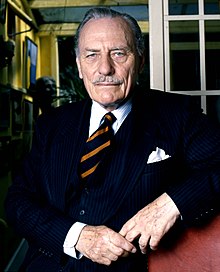Enoch Powell
|
The Right Honourable Enoch Powell MBE |
|
|---|---|
 |
|
| Member of Parliament for South Down |
|
|
In office 10 October 1974 – 11 June 1987 |
|
| Preceded by | Lawrence Orr |
| Succeeded by | Eddie McGrady |
| Shadow Secretary of State for Defence | |
|
In office 7 July 1965 – 21 April 1968 |
|
| Leader | Edward Heath |
| Preceded by | Peter Thorneycroft |
| Succeeded by | Reginald Maudling |
| Secretary of State for Health | |
|
In office 27 July 1960 – 18 October 1963 |
|
| Prime Minister | Harold Macmillan |
| Preceded by | Derek Walker-Smith |
| Succeeded by | Anthony Barber |
| Financial Secretary to the Treasury | |
|
In office 14 January 1957 – 15 January 1958 |
|
| Prime Minister | Harold Macmillan |
| Preceded by | Henry Brooke |
| Succeeded by | Jack Simon |
| Member of Parliament for Wolverhampton South West |
|
|
In office 23 February 1950 – 28 February 1974 |
|
| Preceded by | Constituency established |
| Succeeded by | Nick Budgen |
| Personal details | |
| Born |
John Enoch Powell 16 June 1912 Birmingham, England |
| Died | 8 February 1998 (aged 85) London, England |
| Political party |
Conservative (1947–1974) Ulster Unionist (1974–1987) |
| Spouse(s) | Pamela Wilson (1952–1998) |
| Children | 2 |
| Alma mater |
Trinity College, Cambridge University of London |
| Religion | Church of England |
| Military service | |
| Allegiance |
|
| Service/branch |
|
| Years of service | 1939–1945 |
| Rank |
|
| Unit |
Royal Warwickshire Regiment General Service Corps Intelligence Corps |
| Battles/wars |
World War II • North African Campaign • India |
| Awards |
|
John Enoch Powell, MBE (/ˈdʒɒn ˈiːnɒk paʊl/; 16 June 1912 – 8 February 1998), best known as Enoch Powell, was a British politician, classical scholar, philologist and poet. He served as a Conservative Member of Parliament (MP, 1950–74), Ulster Unionist Party (UUP) MP (1974–87), and Minister of Health (1960–63).
Before entering politics, Powell was a classical scholar, becoming a full professor of ancient Greek at the age of 25. During the Second World War, he served in both staff and intelligence positions, reaching the rank of brigadier in his early thirties. He also wrote poetry, his first works being published in 1937, as well as many books on classical and political subjects.
Powell became a national figure following his 20 April 1968 address to the General Meeting of the West Midlands Area Conservative Political Centre, which became known as the "Rivers of Blood" speech. It pointedly criticized immigration into Britain from the Commonwealth nations and opposed the anti-discrimination legislation being mooted at the time. In response, Conservative party leader Edward Heath sacked Powell from his position as Shadow Defence Secretary (1965–68) of the government's Tory opposition.
...
Wikipedia
